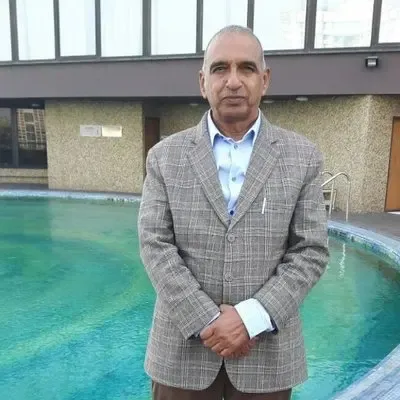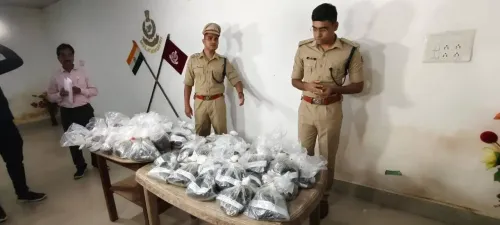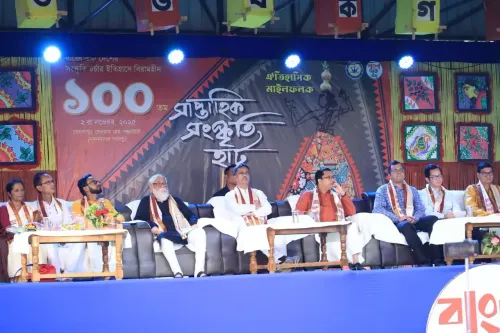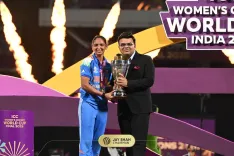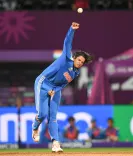DMK Struggles to Combat BJP's Ascendancy in Tamil Nadu: A.N.S. Prasad
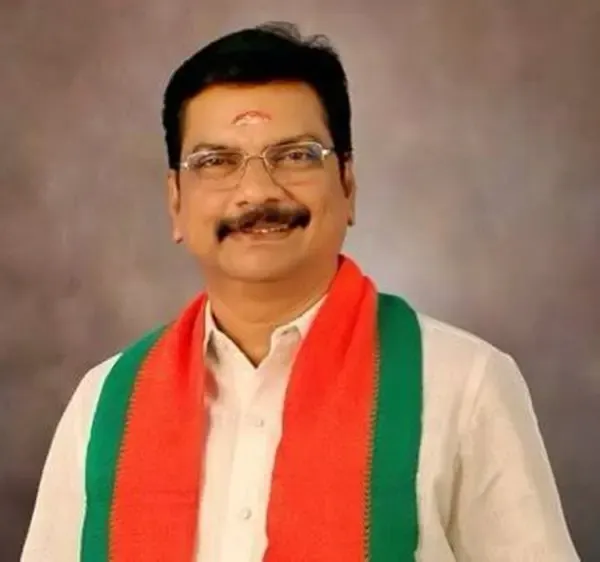
Chennai, Dec 23 (NationPress) Senior Tamil Nadu BJP leader and spokesperson A.N.S. Prasad asserted that the ruling DMK is making frantic efforts to counter the increasing influence of the BJP in the state.
He remarked that by adopting resolutions containing unsubstantiated allegations against the Modi government at the Centre, the DMK has effectively recognized the BJP as its primary adversary in the region.
Prasad emphasized that the DMK executive committee accepts that the political environment in Tamil Nadu has transitioned into a 'DMK versus BJP' scenario.
The senior leader predicted a severe defeat for the DMK in the 2026 Assembly elections, similar to its loss in 2011.
A.N.S. Prasad commented that the DMK executive committee meeting held on Sunday (December 22) was merely a customary event to extol Chief Minister M.K. Stalin and Deputy Chief Minister Udhayanidhi Stalin.
According to the BJP leader, like previous executive committee gatherings, this one concluded as a session for glorifying the Stalin family.
During the meeting, Chief Minister Stalin asserted that the DMK would secure a seventh term, while Deputy Chief Minister Udhayanidhi Stalin claimed that the party would win over 200 seats, Prasad stated.
He pointed out that since the DMK fell under the influence of Karunanidhi's family, it has failed to win consecutive elections unless the opposition parties were divided or unable to forge strong alliances.
The Tamil Nadu BJP spokesperson stated that the DMK's recent electoral success can be traced back to internal strife within rival alliances, unattainable false election pledges, and misleading propaganda regarding central government initiatives, which ultimately benefited the party.
Prasad declared, “This will not be the case in the 2026 Assembly elections. A robust alliance will form to defeat the DMK, rendering the claims of the 'father-son duo' about forming the government again or winning more than 200 seats as mere fantasies.”
He alleged that in the past three and a half years of DMK governance, corruption has reached alarming levels, with activities such as obtaining school certificates or accomplishing any tasks in government offices being contingent on bribery.
The BJP leader noted a significant decline in law and order in Tamil Nadu.
He cited incidents like the brutal murder of a BJP worker in Vellore who challenged corruption, allegedly by a DMK-linked panchayat leader.
Prasad also mentioned a daylight murder that occurred on court premises in Tirunelveli.
He criticized the DMK government for continuing to impose burdens on the populace through hikes in electricity tariffs, property taxes, and milk prices.
Prasad asserted that the DMK has no prospects of regaining power, recalling similar bold assertions made during its tenure from 2006 to 2011 when they claimed they would return to power, yet in the 2011 Assembly elections, they could not even achieve the status of the Opposition.
Prasad predicted that the DMK would face a similar fate in the 2026 elections, expressing no doubts about this outcome.
He mentioned that during the executive committee meeting, the DMK passed resolutions opposing 'One Nation, One Election,' condemning Union Home Minister Amit Shah, criticizing the auction of tungsten mines in Madurai, and opposing the Vishwakarma scheme, among other issues.
He noted that this meeting was targeted at countering the BJP and demonstrates that the DMK recognizes the political contest in Tamil Nadu has become a direct confrontation between the DMK and BJP.
A.N.S. Prasad criticized the unresolved fishermen's issue as a direct consequence of the DMK and Congress administrations surrendering Katchatheevu to Sri Lanka.
He added, “The fishermen of Tamil Nadu and the public will never forgive the DMK for allowing this to happen silently. Even when the UPA, which included the DMK, held power at the Centre from 1996 to 2004, they did nothing to reclaim Katchatheevu.
Prasad remarked, 'Now the DMK's organizing secretary, R.S. Bharathi, asserts that the party opposed the handover of Katchatheevu - a claim that the public will never accept.'
He argued that the resolutions adopted by the DMK executive committee illustrate the party's attempt to portray the central BJP government as acting against the interests of Tamil Nadu.
Prasad stated, “They think that generating anti-BJP sentiment among the populace will result in electoral success. However, this strategy will fail.”
He predicted that in the upcoming Assembly elections, the DMK would suffer a humiliating defeat, akin to 2011, and may not even attain Opposition status.
He attributed the DMK's anxiety to the Modi government's welfare programs gaining popularity in Tamil Nadu, threatening to disrupt the DMK's divisive and caste-based rule.
According to Prasad, the DMK's attempts to undermine the Modi government through false propaganda have faltered, and its efforts to instigate unrest in the state have been unsuccessful.
He claimed that the DMK's resolution was a thinly disguised attempt to distract from its anti-people governance and its desperation to hold onto power.
“The people of Tamil Nadu will see through the DMK's maneuvers and continue to back the Modi government's development agenda,” Prasad concluded.

